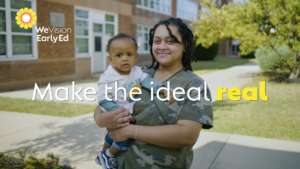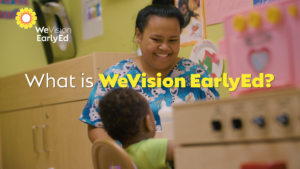Together, we can make the ideal real
If you’re ready to challenge the status quo in child care and move from “it is what it is” to “what it should be,” you’re in the right place!
Re-envisioning and re-creating the system takes all of us, and we have many ways for you to get involved. Here are a few things everyone can do right now.
It Is Possible:
Making the Ideal Real
Download our updated report to see how WeVision EarlyEd is working to make the ideal real — right now.
Spark the Conversation
Help us spread the word about WeVision EarlyEd and our work to re-envision child care. Share these videos to lift up the work to transform child care in D.C. — and beyond.
More ways to get involved
Wherever you are, we are eager to partner with you. If you are also grappling with making the ideal real, reach out! We can provide briefings or presentations on this work and guidance or technical assistance for your community.
Educators, Administrators and Families
- Sign up to follow and inform this initiative.
- Share and discuss this report with your network.
- Follow WeVision EarlyEd on social media (Instagram and LinkedIn).
- Document and share your current and ideal experiences with professional advocates, policymakers, and government agency staff.
- Join and connect with other advocates. You are not alone.
- Review and rethink the outdated mindsets/ideas that keep the status quo in place.
- Promote the more transformative mindsets/thinking described in this report.
- Vote for political candidates who are committed to making your ideal system more real or consider running for a political office yourself.
Policymakers
- Sign up to follow and inform this project. Share and discuss this report with your network.
- Follow WeVision EarlyEd on social media (Instagram and LinkedIn).
- Seek opportunities to learn more about the current experiences of educators, administrators, and families, and pay particular attention to those who have been historically marginalized because of their race, culture, gender, income, immigration status, and/or abilities.
- Review and rethink the outdated mindsets/thinking that keep the status quo in place. Promote the more transformative mindsets/ideas described in this report.
- Build alliances with other policymakers to advance public policies and financing that can help make the ideal real.
- Hold government staff accountable for reducing pain points and making the ideal system more real.
Philanthropic Organizations
- Sign up to follow and inform this project.
- Share and discuss this report with your network.
- Follow WeVision EarlyEd on social media (Instagram and LinkedIn).
- Work alongside your grantees and colleagues to review and rethink the outdated mindsets/ideas that keep the status quo in place.
- Promote the more transformative mindsets/thinking described in this report.
- Fund or co-fund opportunities to help educators, administrators, and families document and share their current and ideal experiences, and pay particular attention to those who have been historically marginalized because of their race, culture, gender, income, immigration status, and/or abilities.
- Fund or co-fund advocacy organizations (including 501(c)(4) activities, if possible) to advance public policies (with public financing) that can help make the ideal real.
- Fund or co-fund community organizations that can test practical solutions that make the ideal more real.
Policy Advocacy Professionals
- Sign up to follow and inform this project.
- Share and discuss this report with your network.
- Follow WeVision EarlyEd on social media (Instagram and LinkedIn).
- Seek equitable opportunities to learn more about and elevate the current experiences of educators, administrators, and families, and pay particular attention to those who have been historically marginalized because of their race, culture, gender, income, immigration status, and/or abilities.
- Review and rethink the outdated mindsets/ideas that keep the status quo in place.
- Promote the more transformative mindsets/thinking described in this report.
- Build alliances with other policy advocates to advance public policies (with public financing) that can help make the ideal real.
- Hold government staff and policymakers accountable for reducing pain points and making the ideal system more real.
Government Agency Staff
- Sign up to follow and inform this project.
- Share and discuss this report with your network.
- Follow WeVision EarlyEd on social media (Instagram and LinkedIn).
- Seek equitable opportunities to learn more about the current experiences of educators, administrators, and families, and pay particular attention to those who have been historically marginalized because of their race, culture, gender, income, immigration status, and/or abilities.
- Review and rethink the outdated mindsets/ideas that keep the status quo in place. Promote the more transformative mindsets/ideas described in this report.
- Build alliances with other government agency staff to provide programs and services that can help make the ideal real.
- Document how your team or agency is reducing pain points and making the ideal system more real.
- Create the conditions needed to test practical solutions that make the ideal more real.
Researchers
- Sign up to follow and inform this project.
- Share and discuss this report with your network.
- Follow WeVision EarlyEd on social media (Instagram and LinkedIn).
- Work alongside colleagues to unpack and rethink the outdated mindsets/ideas that keep the status quo in place.
- Promote the more transformative mindsets/thinking described in this report.
- Create equitable opportunities to help educators, administrators, and families document and share their current and ideal experiences.
- Document how the current and ideal systems impact educators, administrators, and families, and pay particular attention to those who have been historically marginalized because of their race, culture, gender, income, immigration status, and/or abilities.
- Partner with community organizations (including ECE programs) to test practical solutions that make the ideal more real.


